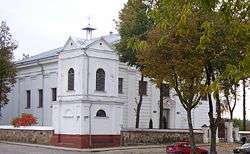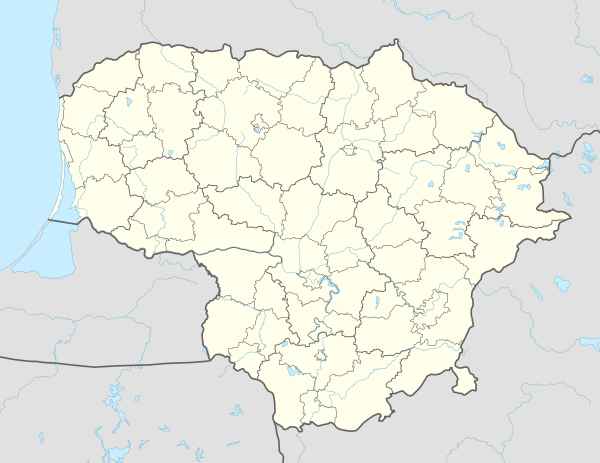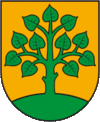Leipalingis
| Leipalingis | ||
|---|---|---|
| Town | ||
 | ||
| ||
 Leipalingis Location in Lithuania | ||
| Coordinates: 54°05′10″N 23°51′40″E / 54.08611°N 23.86111°ECoordinates: 54°05′10″N 23°51′40″E / 54.08611°N 23.86111°E | ||
| Country |
| |
| Ethnographic region | Dzūkija | |
| County |
| |
| Municipality | Druskininkai municipality | |
| Population (2011) | ||
| • Total | 1,552 | |
| Time zone | UTC+2 (EET) | |
| • Summer (DST) | UTC+3 (EEST) | |
Leipalingis is a small town in Alytus County in southern Lithuania. In 2011 it had a population of 1,552.[1]
History
1.5 km south of Leipalingis is Černiauskas mound, 2 km southwest - Druskininkiai mound. In the western part of Leipalingis, to the west of Seira river right bank is archeological Leipalingis cemetery. Therefore, the area, which was destroyed by crusaders before the second half of the 13th century, could have a defensive meaning.
The Leipalingis Manor is first mentioned in 1503, the town itself, later known for some time as Lepunikai - in 1516.
From the sixteenth century Leipalingis belonged to orthodox Sapieha family, who in 1520 built an orthodox church. Later they became Catholics and built the first catholic church. After Sapiehas, Leipalingis belonged to Masalskiai and from the end of the 18th century - to Plateriai families.
During 1654-1667 war the town was burned down. In 1818-1950 it became a district of the municipality. Next to the Leipalingis Manor operated an iron foundry. At the end of the 19th century, Leipalingis became an important junction between the roads connecting Seinai with Seirijai and Merkinė.
Around 1817 a parish school was established, on 1906 - a library. On 9 September 1941, on the orders of the Nazi occupation authorities, 155 people belonging to a local Jewish community were executed. The town suffered greatly during the Second World War.
After the war, the Leipalingis and its surroundings was one of the centers of the Lithuanian resistance movement against Soviet occupation. Šarūnas' team operated here. Due to these activities, the Soviet authorities deported 51 inhabitants of the city to Siberia. 1950-1995 in Leipalingis operated a collective farm, a sewing workshop "Baltija", a rural outpatient center, a shopping center. In town currently operates a nursery-kindergarten "Liepaitė", a sewing workshop, a forest district.
Leipalingis coat of arms was approved in 2003.[2]
References
- ↑ "2011 census". Statistikos Departamentas (Lithuania). Retrieved August 14, 2017.
- ↑ "156 Dėl Leipalingio herbo tvirtinimo". www3.lrs.lt. Retrieved 2018-08-17.

